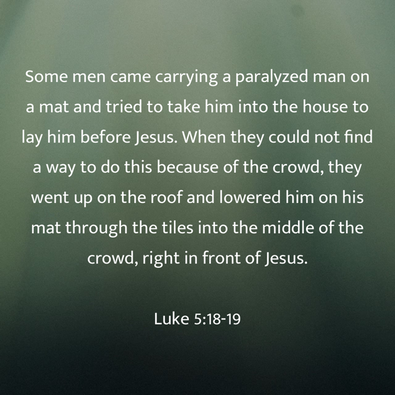|
Congratulations to Pastor Clayton and Leslie on the birth of their son this morning!
Gathering Around the Word
Prelude Carol Smith Announcements CALL TO WORSHIP: What are we to fear? Our God has defeated the enemy. Though many things would try to pull us away, we are firmly rooted in the truth about Jesus Christ. But isn’t the enemy too powerful? His temptation too great and sin too destructive? Our God is greater than any power of the world. And that God lives in us! His Spirit empowers us! We never walk alone. Truly, God has come to us in the person of Jesus. Though the power and influence of the enemy is great, God’s power and greatness are unmatched. He has won the battle and has set His people free. Worship Him today. INVOCATION:
* HYMN “Lord, I Want to Be a Christian” # 729
* PRAYER OF CONFESSION: Holy and gracious God, at times we feel so frail and fragile, getting blown about by the latest crisis, by bad news, by our short tempers and failings. You call us to hold fast to what is good, but so often we flounder, unable to find the solid thing that will center us again. Help us, we pray. Help us to see You as our center, and to cling to the good that You create in the world. Help us to set aside all our jealousies and prejudices, our betrayals and lies, and all that adds to the world’s hurt. Help us to grow even more into Christ’s likeness hat we will bear His love and truth to the world. In the name of Your Son we pray, Amen * Time of silent prayer *Assurance of Pardon *Response – Gloria Patri (Hymnal page 581) *Passing the Peace The peace of the Lord Jesus Christ be with you. And also, with you. CHILDREN’S CHAT Prayer for Illumination Scripture reading: John 15: 1-8 Debbie Mary Sermon text: Psalm 18 The Word of the Lord Thanks be to God! *HYMN “Come, Thou Almighty King” # 2 Apostles Creed Presentation of our tithes and offering Offertory Doxology *Prayer of dedication Concerns and Celebrations Prayers of the People The Lord’s Prayer *HYMN “Be Thou My Vision” # 450 *Benediction Postlude
BIRTHDAYS: none this time
ANNIVERSARIES: none at this time SYMPATHIES: To the Family of Daren Wood To the Family of Bob Seaman Remember our food collection, and Jesus said, “You give them something to eat”. Please let Betty Fisher know of anyone within the community that may be in need at this time. Ladies Tea will be held At North Buffalo Church Social Hall on Saturday, May 4th at 1:00. The entertainment will be by Coty Shingle. Tickets are $10.00. You can see Mary Hathaway or Lois Miller after church. There will be a signup sheet if you care to bake something for the tea. There will be a meeting for the 250th Anniversary. Monday night at 7 pm. Please come if you are interested in helping. Next Sunday will be our last Covered Dish Dinner after Church until the Fall. We are planning on having a cookout indoors. Soooo Bring your favorite dish and join the fellowship. Hot Dogs and Burgers are on the menu.
Continuing Prayer List
Chuck Dicks, Ricci Amos, Frank Huffman, Sandy Stone, Tom Westfall, Sarah Wilson, Carl Weber, Chuck Harton, Suzy Smith, Fred Wilkinson, Haley Diedier Bedillion, Donna West, Marley Smith, Helen Provenzano, Carol Pierce, Johnny Yurko, Jim King, Betty Fisher, Mary Stoey, Ron Poznic, Tim Knabensue, Norma Jean Kelso, Ron Westfall, Carol Bentrem, Chuck Kapaika
0 Comments
Good morning!
We're so glad you decided to join us today!
When we meet together, we take some time to share our joys and concerns. If you have any prayer requests, please add them to this post as a comment. When you are ready, use the prayer below (source) to get started.
O Lord God, Almighty Creator and Sustainer, why you choose to love me and bless me with your grace is a great mystery to me. You know my thoughts. You know my motives. While I am working on making those areas of my life more holy, I recognize that I need the cleansing and power of your Holy Spirit in the inner most places of my existence. Cleanse my heart and conform my thoughts to your will. In Jesus' name, I pray. Amen.
Today's lesson is on Matthew 15:21-28.
In this modern day, it is easy to mistake Jesus’ answer as an insult. Jesus is creating a metaphor meant to explain the priorities of His ministry. He is also teaching an important lesson to His disciples.
According to John 18:28, Jews in Jesus’ day sometimes referred to Gentiles as “dogs.” Non-Jews were considered so unspiritual that even being in their presence could make a person ceremonially unclean. Jesus had deliberately gone into Gentile territory when he was confronted by the Canaanite woman. The disciples are annoyed and wanted her sent away. She was an outsider. Jesus explained His current ministry in a way that both the woman and the watching disciples could understand. At that time, His duty was to the people of Israel, not to the Gentiles Jesus frequently tested people to prove their intentions. In testing her, Jesus declined her request and explained that she had no legitimate expectation of His help. The woman, however, lived out the principle Jesus Himself taught. Her response proved that she understood fully what Jesus was saying, yet had enough conviction to ask anyway. Jesus acknowledged her faith—calling it “great”—and granted her request. So, according to both the context and language, Jesus wasn’t referring to the Canaanite woman as a “dog,” either directly or indirectly. He wasn’t using a racial slur but making a point about the priorities He’d been given by God. He was also testing the faith of the woman and teaching an important lesson to His disciples. How do we exhibit our faith? Have you ever said or thought: There but for the grace of God go I? In Philippians Paul says, I eagerly expect and hope that I will in no way be ashamed, but will have sufficient courage so that now as always Christ will be exalted in my body, whether by life or by death. “For me, to live is Christ and to die is gain.” In KJV he says “Christ shall be magnified in my body, whether it be by life, or by death.
Prayer
Heavenly Father, we are grateful to be part of your family. Reveal to us the things that prevent us from having great faith. Encourage us when we feel unable to show persistent faith. give us eyes to see people we consider “outsiders” so we can invite them to experience your great mercy. In Jesus’ name, we pray. Amen. Thought to Remember Live by great faith
Questions for Discussion
Benediction
This week's benediction is from the King James Version.
Next week's lesson will be on Romans 3:21-30.
Good morning!
We're so glad you chose to join us today!
When we meet together, we take some time to share about the last week, and any prayer requests we may have. If you have a prayer request, you can add it to the comments on this post. When you are ready, use the prayer below to get started.
Lord Jesus,You chose to be called the friend of sinners. Free me from my sins and bring forth a harvest of love, holiness and truth. Amen
Today's lesson is on Luke 7:36-39, 44-50.
In between last week's lesson about the Centurion's servant being healed and today's lesson, Jesus brought back to life the only son of a widow plus healed people of being blind and other afflictions. Jesus also talked to John the Baptist followers.
Luke summarizes two viewpoints toward Jesus that has emerged. Those viewpoints are revealed by reactions to John the Baptist. On the one hand, “All the people, even the tax collectors, when they heard Jesus' words, acknowledged that God's way was right, because they had been baptized by John”. On the other hand, “the Pharisees and the experts in the law rejected God's purpose for themselves, because they had not been baptized by John. Rejection of John the Baptist, Christ's forerunner, meant rejecting Christ as well. This set the stage for a contrast between those who held those polar opposite viewpoints. The Pharisees advocated strict and scrupulous observances of the Law of Moses. Over time, this resulted in human traditions being added to that law. Today's lesson takes us to an early point in Jesus' ministry when things had gotten serious enough for Pharisees to come from “every village of Galilee and from Judea and Jerusalem” to investigate him. This is one of three times in Luke that Jesus was invited to a meal at the home of a Pharisee. The motive behind the invitations seemed to be that of scrutinizing Jesus more closely, noting any violations of the Law of Moses as interpreted by the Pharisees. We do not know the identity of the woman. We just know she had lived a sinful life. Therefore, the host did not welcome her presence at his dinner. She came with an alabaster jar of perfume. She knelt down behind Jesus and since it was the custom he had his sandals off. She proceeds to wash his feet with her tears. Then she wiped them with her hair, kissed them and poured perfume on them. When the Pharisee said to himself, 'If this man was a prophet, he would know who is touching him and what kind of woman she is – a sinner.” The Pharisee was condemning both the woman and Jesus. Jesus did not fit the idea of how a prophet should conduct himself. The Jews' understanding of what made them unclean was often tied to touching. Pharisees were obsessed with the avoidance of anything unclean or violations of the Law. This woman was the living embodiment of everything they warned against. The contrast between the woman, who expresses her love for Jesus, and the Pharisee, who views her with disdain, could hardly be sharper. Jesus now tells Simon a parable. There was a certain creditor who had two debtors. One owed five hundred denarii, and the other fifty. And when they had nothing with which to repay, he freely forgave them both. Tell me, therefore, which of them will love him more?” Simon answered and said, “I suppose the one whom he forgave more.” And he said to him, “You have rightly judged.” Jesus said to Simon, "Do you see this woman? I came into your house, you did not give me any water for my feet, but she wet my feet with her tears and wiped them with her hair. You did not give me a kiss, but this woman, from the time I entered, has not stopped kissing my feet. You did not put oil on my head, but she has poured perfume on my feet." All of these were an act of hospitality for guests in one's house. Footwear of the era did not keep dust and dirt out. It was proper to at least give your guest water and a towel to wash his feet. It was customary to give your guest a kiss as an expression of greeting and welcome. The offer one's head to be anointed with oil communicated favor. Jesus said “Therefore, I tell you her many sins have been forgiven- as her great love has shown. But who has been forgiven little loves little.” The woman's great love demonstrated that she knew she had much to be forgiven. By contrast, Simon loved little because his scrupulous attention to the Law of Moses had resulted in few sins to be forgiven of. Simon was proud of his tidy lifestyle as a Pharisee, he believed that he was vindicated by his success in keeping the Law of Moses strictly and by his descent from Abraham. The Pharisee understood neither why he needed to love and be loved by Jesus nor how the woman's many sins could be forgiven, especially by Jesus. Jesus said to the woman, “Your sins are forgiven. Your faith has saved you; go in peace.” Jesus clarifies the underlying reason for her forgiveness: her faith, which is the source of her love. By devoting herself to Jesus, she has yielded her heart to him in repentance. The other guest began to say among themselves, “Who is this who even forgives sins?” If Jesus indeed had the power to forgive sins, then he is God-in-the-flesh. But if Jesus did not have such power, then he was guilty of blasphemy.
Conclusion: Who needs forgiveness.
Many unbelievers today are involved in unholy, unbiblical activities. Some even make their living doing things that Christians know are immoral. It is easy for those within the church to take a dim view of these people, judging them to be incorrigible sinners. To be sure, a judging function does (or should) exist legitimately with the church. But this judging function bears little, if any, resemblance to the one used by Simon the Pharisee. His viewpoint was that of complete rejection, thinking himself more highly and being confident of his own righteousness. But Simon was not completely sinless. As a student of the Law of Moses, he should have realized, as the Pharisee Paul did,that “all have sinned and fall short of the glory of God”. Another way to look at it is to imagine a survey being taken in Pharisee Simon's village. The survey question is, “Who needs to be forgiven, Simon or the immoral woman?” The villagers would predictably respond overwhelmingly to the immoral woman. But this is really a trick question since it presents a false choice. It is not a matter of “either/or” but one of “both/and.” They both needed to be forgiven of sin. They both needed a humble faith that would bring them to God with hearts full of love. They both needed to follow Jesus, love God, and serve others, The tragedy of this story is that only one of these people left the banquet forgiven. Simon's apparent pride in seeing himself superior to the woman blocked any realization of needing forgiveness. Christians are to flee from sin and obey God. We show our love for God when we keep his commandments. But does this justify us when we reject and condemn those who struggle with sin? Are sinners welcome in our fellowship if they are seeking to love Jesus? Or must they clean up their sinful lives before they enter the doors of our church? Jesus taught that even the vilest of sinners can be forgiven if they turn to him in faith and love. Are we willing to follow him in his love for sinners and help them as they strive to follow Jesus, however imperfectly?
Prayer
Heavenly Father, you have shown us your willingness to forgive sinners. May we not keep that message to ourselves! And let us not be selective in pretending to know who will accept and who won't. Help us to love our neighbors as you love us by taking the good news of your Son to them. In his name we pray. Amen. Thought to Remember: To have forgiveness, we must first realize that we need it.
Questions
Benediction
Today's benediction is from the King James Version
Next week's lesson will be on Matthew 15:21-28.
Gathering Around the Word
Prelude Ron Dobscha Announcements CALL TO WORSHIP: Jesus comes to take away our sins. He removes it, removes our love for it and causes us to love Him. Jesus is what we were not. He is our help when we are at our weakest. Even when we falter, He upholds us. What a friend and advocate we have in Jesus. Come and worship Him for He alone is worthy. INVOCATION
* HYMN “Because You Live, O Christ” # 249
* PRAYER OF CONFESSION; Heavenly Father, as adopted people You call us to righteousness You make it clear that people transformed by Your grace are to renounce the ways of sin and to live like You. We know this and it is still a hard and long process. Turning from sin is not easy and we fall for the same temptations over and over. We do not bear the fruit that redeemed people ought to. We do not practice righteousness; we do not love our neighbors. Knowing that we are still, even today sinful, we look to our Helper and Advocate for help. Remember Jesus’ righteousness and not our unrighteousness. Forgive us according to His mercy and not our stubbornness. Prepare us as people restored to You and ready to give our lives in obedience. Amen * Time of silent prayer *Assurance of Pardon *Response – Gloria Patri (Hymnal page 581) *Passing the Peace The peace of the Lord Jesus Christ be with you. And also, with you. CHILDREN’S CHAT Prayer for Illumination Scripture reading: Acts 3: 12-19 Mary Esselstyn Sermon text: 1 John 3: 4-10 The Word of the Lord Thanks be to God! *HYMN “Open My Eyes, That I May See” # 451 Apostles Creed Presentation of our tithes and offering Offertory Doxology *Prayer of dedication Concerns and Celebrations Prayers of the People The Lord’s Prayer *HYMN “Joy to the World” #266 *Benediction Postlude
BIRTHDAYS:
Linda Hildebrand ANNIVERSARIES: Bryan & Garnet Welling SYMPATHIES: Remember our food collection, and Jesus said, “ You give them something to eat”. Please let Betty Fisher know of anyone within the community that may be in need at this time. This years, Ladies Tea will be held At North Buffalo Church Social Hall on Saturday, May 4th at 1:00. The entertainment will be by Coty Shingle. Tickets are $10.00. You can see Mary Hathaway or Lois Miller after church. There will be a signup sheet if you care to bake something for the tea. The W&J Choir and Camerata Singers invite us to their Spring Choral Concert On April 19, at 7:30 pm at Church of the Covenant. They will present Faure’s Requiem and Berstein’s Chichester Psalms . Joining the choirs will be singers from Pittsburgh Concert Chorale, a professional orchestra, and soloists, Jessica Tomsic, Graham Fandrei, and Hudson Vasquez Schmitt. The concert is free.
Continuing Prayer List
Chuck Dicks, Ricci Amos, Frank Huffman, Tom Westfall, Sandy Stone, Sarah Wilson, Carl Weber, Chuck Harton, Suzy Smith Fred Wilkinson, Haley Diedier Bedillion, Donna West, Marley Smith, Helen Provenzano, Marlene McFeely, Carol Pierce, Johnny Yurko, Jim King, Betty Fisher, Mary Stoey, Ron Westfall, Beckett, Grandson of Scott Shetter, Ron Poznick Stella Crothers, Lori Patterson, Norma Jean Kelso, Dave Cummings
Good morning!
We're so glad you decided to join us today!
When we meet in person, we share our joys and concerns with each other. If you have prayer requests to share, you can add them to the comments on this post. When you are ready, you may use the prayer below to get started:
Lord, we see so much need around us — needs for our world and our country, needs for our churches and our friends, even our personal needs. Sometimes it is overwhelming.
Help us not to get so caught up in the problems and struggles of life that we fail to look to you and to understand that you have the power, even now, to meet every need. When you seem distant, remind us that you are with us and that you indeed hear and answer our prayers, if we continue to look to you and to trust in you. And so we bring all our needs to you this morning, and we ask for your peace and healing. In Jesus’s name. Amen.
Today's lesson is on Luke 7:1-10.
Lesson context
Today’s lesson is set in the village of Capernaum, which served as something of a headquarters for Jesus’s ministry in Galilee. Its importance can be seen in the fact that it is mentioned 16 times in the New Testament. In fact, five of Jesus’s inner circle of 12 disciples were living in Capernaum when Jesus called them to follow him. Four of them were fishermen and one was a tax collector. According to our lesson, the village probably had no more than a few hundred residents. However, it was a thriving regional hub of industry and commerce. This was because it was on a lake that was productive for the fishing industry and, secondly, because was situated on a main road for traveling throughout the region. It was important enough that Rome had stationed some of its soldiers there.
Desperate need (verses 1-5)
Chapter 6 of Luke ends with Jesus concluding his so-called Sermon on the Plain. As our lesson begins, Jesus moves from the level place where was speaking to a crowd and he enters Capernaum. Pretty quickly, it seems, word of his arrival spread across the village. A Roman centurion heard about Jesus’s arrival and sent some Jewish elders to Jesus to ask him to come and heal his servant. Each centurion commanded about 80 men, although some commanded more. The rank was normally the highest a man could achieve if he was not a member of Roman ruling class family. Becoming a centurion was a path to wealth and status for an ordinary citizen soldier who had proved himself in lower ranks over the course of 15 or 20 years. This centurion seems to have achieved some status. He had a servant, likely a slave who had been captured during one of his military campaigns. Slavery in Rome was not like slavery in early American history. Slaves in the Roman Empire did not always serve as slaves their entire lives and were not always treated poorly or exploited. The centurion seems to have valued his servant not just for his work but also as a person. The centurion also had a good reputation in the Jewish community because of his love for their religion. He had even used his wealth and position to build the Jewish synagogue at Capernaum. Instead of approaching Jesus himself, therefore, he sends the elders, perhaps thinking Jesus might respond more favorably to them.
Unmatched faith (verses 6 to 10)
Capernaum was not a large city, either in terms of its population or is area. Crossing from one end to the other would not have taken more than 15 minutes. The walk would have been a short one. Jesus went with the elders, but as they neared the house, the centurion sent some friends to meet Jesus and to tell him that he did not need to enter the house. His message to Jesus was that he respected Jesus so much that he did not feel worthy to have him come into his house. However, he also said that he had faith that Jesus could heal his servant by simply saying the word. This was a display of humility by a man who, on an earthly level, had power over Jesus and the Jewish people. It may also have shown an understanding of the negative implications for a Jew to enter the home of a Gentile. It would have meant the Jew was defiled. (See Acts 10:27-29) The centurion used his experience as an officer to explain his view of Jesus’s authority. The centurion (as we have already seen in the story) has authority to send others to act on his behalf without having to do it himself. Jesus, however, has authority on much higher level — authority to command that people be healed or that demons come out of people. Jesus does not have to be physically present for that to happen. When Jesus hears the message he is amazed and tells the people that he has not seen such faith even among the people of Israel. In nearly every other case, people are amazed at Jesus’s teachings and works, but here Luke tells us that Jesus is amazed at the centurion and his faith. That is undoubtedly because he displayed humility and compassion but also an understanding of Jesus’s true status and power. The centurion implicitly trusted that Jesus could and would heal his servant. As far as Luke is concerned, the centurion’s faith is the greatest miracle in this passage. The centurion’s trust in Jesus was not in vain. When his friends returned to the house, they found the servant was well. This is one of three stories in the Gospels in which Jesus healed people without being physically present with them. The others are found in Matthew 15:21-28 and John 4:46-54.
Conclusion
When we offer up intercessory prayer for the healing of a friend or family member, are we exercising the faith of the centurion? Without a doubt, any forthcoming healing will be a “remote healing” since Jesus is not here in the flesh, so that is not the issue. The issue, instead, is one of believing in Jesus’ authority. That’s the essence of what we might call “Centurion Faith.” Our intercessory prayers must have more than a “maybe” or “hope so” tone. When we fix our eyes of Jesus, we demonstrate “Centurion Faith” that God will answer our prayers. When we are distracted from him and wring our hands in despair, nothing good happens (Matthew 14:25-31). Jesus taught, “If you believe, you will receive whatever you ask for in prayer” (21:22). The centurion’s background speaks loudly. He had cultivated friendships within his community for years. He had treated his neighbors with respect and honor, not pulling his rank as a Roman officer to get his way. In many ways, the significant gap between the Jews and Gentiles of Jesus’ day was bridged on that day in Capernaum. The centurion had used his wealth and influence to protect the Jews and provide a gathering place for their study of Scripture. He played “the long game” in the most sincere and authentic manner possible. When his household was in need, his character and actions were remembered. Can the same be said of ours?
Prayer
Heavenly Father, our lives constantly need for your support and healing. Our churches and homes need your presence. May we honor you in all ways and never doubt. May we have a simple faith like the centurion! We pray in the name of Jesus, your Son. Amen.
Questions for discussion
Benediction
Today's benediction is from the King James Version.
Next week's lesson will be on Luke 7:36-39, 44-50.
Gathering Around the Word
Prelude: Pam Stewart Announcements: CALL TO WORSHIP: Our God has lavished on us such great love. When we were content with being children of the world, our God adopted us and made us His own. We do not know the fullness of the glory that awaits those in Christ. But we are satisfied and anticipating that when we see our Savior’s face, we will be like Him! God finds us in our lowly state but does not leave us there. He purifies us, changes us, and redirects our lives to Him. Praise God for His saving work and sanctifying work in us. Let us gather today and worship Him. INVOCATION
*Hymn: “O Christ, The Great Foundation” # 361
*PRAYER OF CONFESSION: Father, even though we are people of the world, You call us to live in the reality of a new kingdom ushered in by Your Son. We are born, prone to the influence of the world around us but You tell us that we must be born again by Your Spirit. Every day we see and hear the Spirit leading us and transforming us and yet, we are still often resistant. Like a rebellious child, we resist the work of our Father. Forgive us Lord, for the ways we hold onto our old lives before Christ. Forgive us for ignoring and complaining about the methods you use to make us holy. From the mercy we receive, create in us a deeper sense of obedience and set our eyes on the promise of being made fully anew in the presence of Your Son. Amen. *Time of Silent Prayer: *Assurance of Pardon *Response – Gloria Patri #581 Passing of the peace The peace of the Lord Jesus Christ be with you. And also with you. Children’s Chat Prayer of Illumination Scripture: John 8: 39-47 Don Herschell SERMON TEXT: 1 John 3: 1-3 The word of the Lord Thanks be to God! *Hymn: “Take My Life” #697 *Apostles Creed (next to prayer list) Presentation of tithes and offering Offertory *Doxology *Prayer of dedication Concerns and Celebrations Prayers of the people The Lord’s Prayer *Hymn: “Love Divine, All Loves Excelling” #366 * Benediction Postlude
BIRTHDAYS:
Ava Clifford ANNIVERSARIES: None SYMPATHIES: To the Family of Dana Wilson Remember our food collection, and Jesus said, “ You give them something to eat”. Please let Betty Fisher know of anyone within the community that may be in need at this time. Today is our covered dish dinner after the service in the social hall. Please come join for good food and fellowship. Session will meet Monday, April 8th at 7 p.m. Missionary meeting is Tuesday the 9th of April at 9:30 a.m. Please join us for fellowship. Women on Wednesday (WOW) will be meeting on April 10 at 9:30 a.m. There will be an outdoor workday on Saturday, April 13 at 8:30 am, weather permitting. As a reminder, any joys or concerns, please let Diana Donaldson know.
Continuing Prayer List
Chuck Dicks, Ricci Amos, Frank Huffman, Tom Westfall, Sandy Stone, Sarah Wilson, Carl Weber, Chuck Harton, Suzy Smith, Fred Wilkinson, Haley Diedier Bedillion, Donna West, Marley Smith, Helen Provenzano, Marlene McFeely, Carol Pierce, Johnny Yurko, Jim King, Betty Fisher, Mary Stoey, Ron Westfall, Beckett, Grandson of Scott Shetter, Ron Poznick, Stella Crothers, Lori Patterson, Norma Jean Kelso, Ron Dobscha
Good morning!
We're so glad you decided to join us today!
Each week when we meet together, we take some time to share any joys and concerns we have from the past week. If you have a prayer request, please add it as a comment to this post. When you are ready, use the prayer below (source) to get started.
Lord, thank you for your unconditional love. May you lead us in the right path and enlighten our mind with the truth. May we see the needs of others, love, and serve one another. Give us strength to inspire others. Heal all the people through your love. We have faith in you and we will be with you, forever. This we pray, in the Mighty Name of Jesus Christ. Amen.
This week's lesson is on Luke 5:17-26.
Lesson Context
This gospel and the book of Acts were written by a man named Luke. He was a traveling companion of Paul and a physician (Colossians 4:14; 2 Timothy 4:11; Philemon 24). He gathered his information from people who had witnessed the ministry of Jesus so he could write a detailed account. Most biblical scholars believe that the gospel of Mark was written first, and could have been one of Luke's sources. Today's lesson puts Jesus in Galilee early in his three and a half year ministry. In Luke's telling, the miracle just prior to this one occurred, "in one of the towns," of Galilee. Mark's version specifically places this in Capernaum. This town, located on the northwestern bank of the Sea of Galilee, became something of a headquarters for Jesus during his tours of Galilee.
Faith that Seeks (verses 17-20a)
This passage is the first time that Luke mentions the Pharisees in his gospel. Our book also says that, while many places in the gospels have the translation, "teachers of the law," the original Greek word here only occurs in two other places (Acts 5:34; 1 Timothy 1:7). These teachers are experts in the Mosaic law, able to give sound theological opinions. The presence of these men in the crowd is ominous. They are not religious leaders from Galilee. These men have traveled from Judea and Jerusalem, about an 80 mile walk. The commitment for this trip meant that the work of Jesus required a thorough investigation. Isaiah 61:1-2 is a messianic prophecy, which Jesus read shortly before our passage:
The Spirit of the Sovereign Lord is on me,
because the Lord has anointed me to proclaim good news to the poor. He has sent me to bind up the brokenhearted, to proclaim freedom for the captives and release from darkness for the prisoners, to proclaim the year of the Lord’s favor and the day of vengeance of our God, to comfort all who mourn,
Luke links the healings, both physical and spiritual, as fulfillment of messianic prophecy.
The passage then shifts to the familiar story. Some men carry their paralyzed friend, in the hope that Jesus will heal him. This is a great example of the second greatest commandment: love your neighbor as yourself (Matthew 22:39; Mark 12:31). The man's affliction made it impossible for him to come to Jesus without assistance. But the crowd was so great, the man could not be taken directly to Jesus. First-century Palestinian houses typically had flat roofs with exterior steps or a ladder providing access. Roofs were built with beams resting on the outer walls, with smaller posts crossing the beams and covered with thatch and mud. The rooftop was a place for household activities, drying laundry, and getting fresh air. It was also where people sometimes hid, conferred, mourned and prayed. The paralyzed man's friends were able to carry him up to the roof, and then lower him down. Faith is a mental and spiritual state. We can see evidence of someone's faith in their actions. The crowd definitely saw evidence in the actions of the men. But Jesus could see their faith.
Faith that Finds (verses 20b-26)
Jesus addresses the paralyzed man. The gospel of Luke uses a generic Greek word for friend, while Matthew and Mark use a Greek word that can be translated as, "son." Jesus tells the man his sins are forgiven. The Pharisees and teachers of the law see this statement as blasphemy. God alone can forgive sins. This is correct, in the sense of a person sinning against God. According to Jewish writings in the period between the Old and New Testaments, the Jews expected a righteous Messiah to overthrow foreign invaders. They did not expect a Messiah who would be God-in-the-flesh, able to forgive sins. Our book says that the experts actually had a good grasp of what was happening. Jesus was speaking and acting in a manner reserved for God. For a mere human to forgive sins committed against God would indeed be blasphemy. This is the first instance of organized opposition to Jesus in the Gospel of Luke. Just like Jesus could see the faith of the paralyzed man, he knew what the Pharisees were thinking about. The ability to know people's hearts and innermost thoughts is one of the divine characteristics of Jesus that Luke emphasizes. Jesus asks the Pharisees and teachers of the law about their thoughts. He then follows up with another question. Our book explains that this could be taken as a couple of different kinds of arguments. Then Jesus tells the man to get up, take his mat and go home. The text here, in Matthew 9:6 and Mark 2:10-11, stress that Jesus healed the paralyzed man as evidence of Jesus' authority on Earth to forgive sin. This passage is also the first time that Luke records Jesus calling himself, "Son of Man." Through the four gospels, this phrase occurs more than 80 times. This designation comes from the Old Testament. In Ezekiel, the title is applied to the prophet, through without suggesting divinity. In the book of Daniel, the designation recognizes the Son of Man as having divine attributes. The paralyzed man is immediately healed. As soon as Jesus has spoken, the man is instantly healed. The man's sudden ability to walk should have been evidence that Christ had both the right and ability to forgive sins. Everyone saw the result. In biblical times, two or three witnesses were required to prove an event was true. Luke confirms that a sufficient number of witnesses were present to verify the miracle. Verse 26 is the only verse in the New Testament where amazement, praising God, and fear occur together as the reactions of a crowd. It is not unreasonable to think that the religious leaders were included in the people having these reactions. The reaction at the end of this passage is one of confused neutrality. The crowd hasn't yet reached a conclusion.
Conclusion
The friends in today's lesson remind us of the nature of authentic friendship. We do not know how long they had been carrying their friend around on this bed. We know that when Jesus came into the city, they believed he could help their friend. However, they did not stop at simply believing. They put their faith into action and brought their friend to Jesus, overcoming every obstacle on the way.
Prayer
Father, we are grateful for the friends who have helped us on our faith journey. We pray that you will help us be the friend who carries the bed of another when needed, regardless of the obstacles in our path. We give you thanks for friends and the strength to be a friend in Jesus' name. Amen.
Questions for Discussion
Benediction
This week's benediction comes from the King James Version.
Next week's lesson will be on Luke 7:1-10.
|
AuthorWe are a small, rural Presbyterian church in southwestern Pennsylvania. Archives
July 2024
Categories
All
|









 RSS Feed
RSS Feed